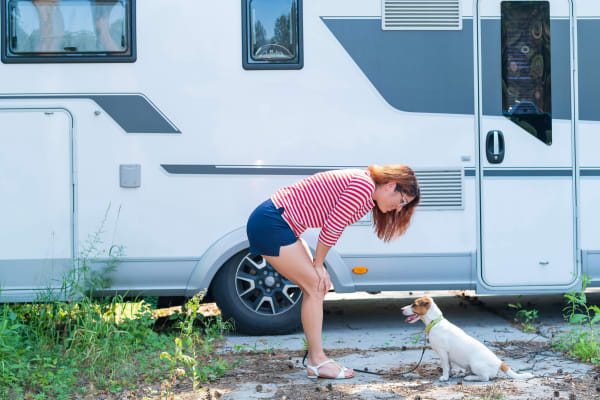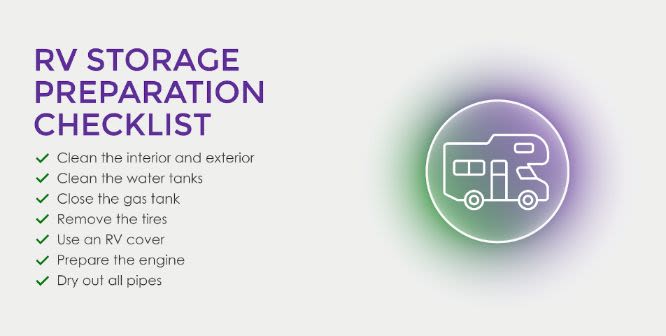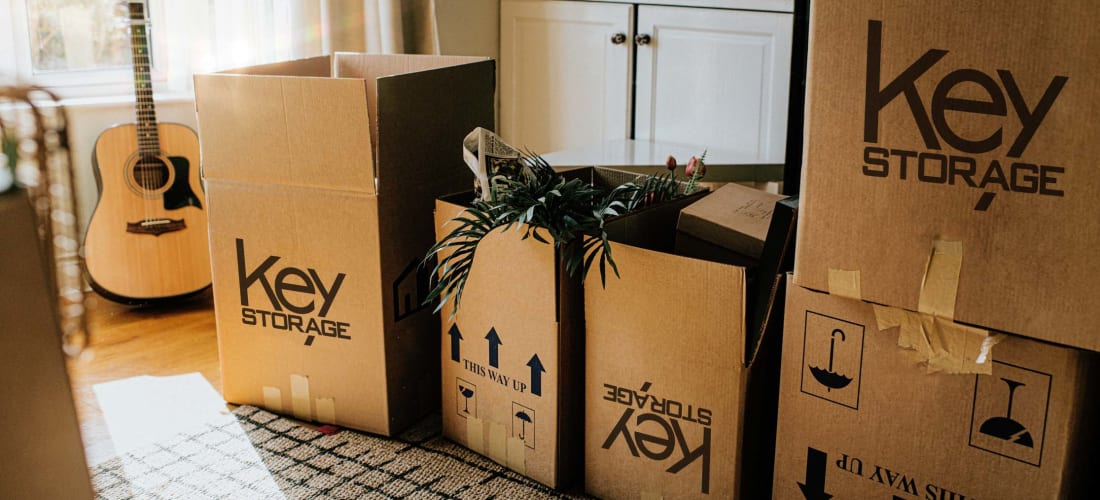RV Storage
If you’re an avid camper, you know finding RV storage can be a challenge. However, at Key Storage, we offer RV storage and camper storage near you, so you can safely store your motorhome or trailer during the off-season. With our affordable covered and indoor RV storage near you, you can have peace of mind knowing your camper is in safe hands at a reasonable price.

Types of RV Storage at Key Storage
At Key Storage, our RV storage facilities can accommodate a wide range of RV types, models, and sizes. With several storage options to choose from, you can find the perfect trailer storage near you that suits your needs.
Indoor RV Space
If you’re looking for the most protection for your RV, our drive-up indoor RV storage units are the perfect option. Similar to a garage, our indoor RV storage units protect your trailer from harsh elements like rain and snow, or extreme heat and sun.

Outdoor RV Space
At Key Storage, our outdoor RV storage varies from location to location. If you're looking for the most affordable way to store your recreational vehicle, outdoor storage is often the best route. With outdoor RV storage, you can park your trailer in a designated parking spot and have peace of mind knowing it's safe and secure with 24/7 video monitoring and on-site resident managers.

Benefits of Key Storage’s RV Storage Facilities
RVs can take up a lot of space and may have to follow local regulatory guidelines. With storage locations across five states, you can find RV storage near you that suits your needs. If you’re wondering whether you need RV storage, consider the benefits our RV storage facilities offer:

Free Up Space
Storing an RV at home can take up a lot of space, especially if you have a trailer that’s more than 30 feet long and can’t fit inside your garage or driveway. At Key Storage, our affordable RV storage allows you to make room in your driveway for you to park your everyday vehicles
Security
Storing an RV at home can take up a lot of space, especially if you have a trailer that’s more than 30 feet long and can’t fit inside your garage or driveway. At Key Storage, our affordable RV storage allows you to make room in your driveway for you to park your everyday vehicles
Avoid local regulations
Storing an RV at home can take up a lot of space, especially if you have a trailer that’s more than 30 feet long and can’t fit inside your garage or driveway. At Key Storage, our affordable RV storage allows you to make room in your driveway for you to park your everyday vehicles
Protection
Storing an RV at home can take up a lot of space, especially if you have a trailer that’s more than 30 feet long and can’t fit inside your garage or driveway. At Key Storage, our affordable RV storage allows you to make room in your driveway for you to park your everyday vehicles
Convenience
Storing an RV at home can take up a lot of space, especially if you have a trailer that’s more than 30 feet long and can’t fit inside your garage or driveway. At Key Storage, our affordable RV storage allows you to make room in your driveway for you to park your everyday vehicles
RV Storage FAQs
What storage unit size do I need for my RV?
RVs can take up a lot of space and may have to follow local regulatory guidelines. With storage locations across five states, you can find RV storage near you that suits your needs. If you’re wondering whether you need RV storage, consider the benefits our RV storage facilities offer:
- 10x15: Some small trailers come in smaller sizes, such as 13 feet, which means they can fit comfortably in a 10x15 foot storage unit.
- 10x20: Our drive-up storage units can also accommodate a wide range of trailers and campers that measure between 15 and 18 feet.
- 10x25: Many Class B and Class C campers, along with travel trailers and pop-ups, can fit in one of our 10x25 RV storage units.
- 10x30: Small to medium-sized Class B campers, along with some Class C motorhomes, can fit in an indoor 10x30 storage unit.
Most of our indoor RV storage units are well-suited for smaller campers, trailers, and motorhomes. Larger RVs, such as Class A campers and RVs, can fit in our outdoor parking spaces.

How do you prepare your RV for storage?
RVs can require a lot of maintenance, which means you want to ensure they stay in good condition while stored, so you can hit the road without any delays the next time you want to start traveling. Before you place your RV in storage, consider these preparation tips:

- Clean the interior and exterior: The first step in preparing your RV for storage is cleaning the inside and outside. Discard any food or beverages that can mold or attract rodents and insects, unplug the refrigerator and thaw out the freezer, clean the outside to prevent dust and bird droppings from damaging the paint, and set insect and rodent traps to avoid pest damage.
- Clean the water tanks: Before storing your RV, visit a station to dump your water and sewage tanks. If left filled during storage, they can easily grow mold and cause unpleasant odors when you return.
- Remove or inspect the battery: When storing your RV or any vehicle for an extended period, the battery can lose its charge. Before short-term storage, make sure to unplug all electronics that can drain your RVs battery. For longer periods of time, consider removing your RV’s battery and storing it in a cool, dry place, and use a trickle charger to periodically charge the battery. PLEASE NOTE: We do not offer trickle chargers or the ability to do this on-site.
- Remove propane tanks: To prevent any gas leaks or potential explosions, make sure to top off propane tanks, remove them, and place them in a cool, dry place.
- Remove the tires: When stagnant for a long period, tires on both cars and RVs can form flat spots that can ruin the tires and require replacement. To prevent this, remove all of the tires from your RV and place your RV on jacks, or use tire saver ramps.
- Use an RV cover: Especially when stored outside, it’s important to cover your RV. RV covers can help protect your camper from elements like rain, snow, and sun that can damage your RVs roof.
- Prepare the engine: There are several key actions you should take to protect your RV’s engine while it’s in storage, such as changing the oil, adding antifreeze to its radiator, adding wiper and brake fluid, and topping off the gas tank and adding fuel stabilizer to prevent moisture from damaging the engine.
- Dry out all pipes: Similar to homes, your RV’s pipes could freeze in the winter. To prevent this, make sure you thoroughly dry out your pipes before storage by sending compressed air through each pipe. It’s often recommended to work with a mechanic when drying your pipes to avoid damage.
Reliable Self Storage,
Whenever You Need It.

